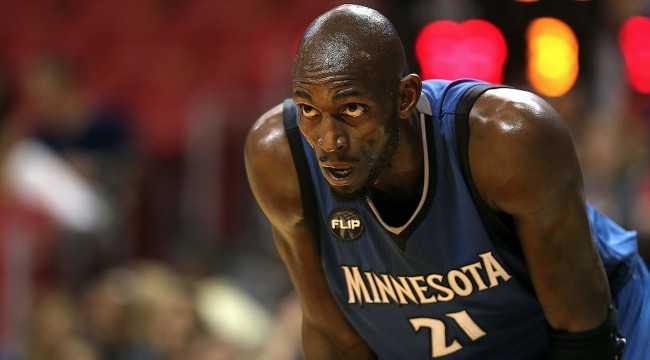
Like Kevin Garnett in general, Flip Saunders’ decision to bring the future Hall of Famer back to where it all began was initially misunderstood.
When the Minnesota Timberwolves traded for him last February, it reeked of a publicity stunt and not much else. Saunders’ team was in the midst of its worst season in franchise history, and had just surrendered a useful player – Thaddeus Young, who was acquired in exchange for a first-round pick – for one who would do little more than put butts in the empty seats of Target Center.
Once the honeymoon ended, though, just how many Minnesotans would show up to watch Garnett labor up and down the floor for 15 minutes a game?
That imminent and widespread excitement not withstanding, the 39-year-old’s return to the Timberwolves was never about marketing. Saunders brought Garnett back to help his career reach full circle, but also to mentor Minny’s impressionable group of youngsters – one that would grow even more promising after the draft lottery balls bounced fortuitously in early May.
Eight volatile months after Garnett donned the off-blue and green again, the late Saunders’ vision is in full bloom. Karl-Anthony Towns is an overwhelming favorite for Rookie of the Year; Andrew Wiggins is making the leap to legitimate stardom; and the Timberwolves are a respectable 6-8, just one year removed from winning a league-low 16 games.
In an excellent piece by Jackie MacMullan of ESPN, the notoriously reclusive Garnett opens up about his tough-love approach to leadership, what it’s like to mentor a player like Towns, and how he’s adjusting to his role as Minnesota’s “OG.”
Garnett on his maniacal intensity and what it takes to thrive in the most competitive league on earth:
“You can’t teach the beast,” Garnett says. “It’s either in you or it isn’t. You can’t just go to the store and buy a six-pack of beast. It don’t work like that.”
[…]
“I always say, ‘I’m not stepping on someone who doesn’t want to be stepped on,'” Garnett says. “Because this is a no-nonsense league. If you’re not in it, and I mean in it today, then they will replace you tomorrow.”
On the importance of personal sacrifice to the young ‘Wolves and how a lack of it ruined his partnership with Stephon Marbury:
“I’m very real with these guys now. I tell them straight up how it is. I tell them there is only one thing that can mess this up: egos. I tell them because I lived it. Because that’s what messed us up with Steph.”
On helping the extremely excitable Towns harness his emotions on the floor:
“I had to pull him aside and teach him how to pick the times you explode,” Garnett says. “For example, when he runs back on defense, he’s yelling for no reason, expending unnecessary energy. By day four he’s got nothing. He’s gassed.”
On his new basketball life as Minny’s seldom-used and nominal player-coach:
“I’m the OG, the original gangster,” Garnett explains. “Like when you go into the neighborhood and they see you and say, ‘There’s the OG.’ It’s a sign of respect, you know? The old guard. The old generation. These guys are the YG. It’s their league now. I don’t mind being the OG. It’s what I am. I’m starting to see my purpose. Every day, it’s clearer and clearer to me.”
And finally, Wiggins and Towns on the impact of the the 2004 MVP and 2008 champion in just several short months:
“As soon as he steps into the building,” Wiggins says, “everyone feels they have to play at a higher level.”
[…]
“Whatever KG tells me to do,” Towns says, “I’m going to do it.”
Glorified Cliff’s Notes don’t do this fantastic article justice; it deserves to be read in full. Garnett rarely opens up to the media, and his willingness to do so to MacMullan – in conjunction with anecdotes from many other influential players and coaches throughout KG’s illustrious two-decade career – results in one of the most fascinating reads of the young NBA season.
You may not like Garnett. That’s understandable. But after another story extolling his virtues as one of basketball’s all-time leaders, it should be impossible for even his most ardent detractors to discount Garnett’s influence on the game – in the past, present, and even future.
(Via ESPN’s Jackie MacMullan)






